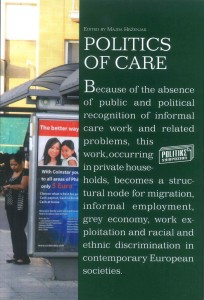
Politics of Care
Numerous research data show that the key strategy by which households, especially in Southern and Western European countries, but increasingly also in Nordic and Eastern European states, compensate for the care deficit in child and elder care is the commoditization of care, i.e. the outsourcing of care work to paid migrant or local care workers. In this collection of papers authors from different European regions critically examine policy responses of different local, national or supranational, governmental or civil society, collective or individual policy actors to these developments. While authors in their articles deploy different theoretical and methodological approaches the fill rogue of the collection is represented by addressing the underlying question arising from the social organization of care work: where the divide is to be drawn between care as a ‘public’ and care as a ‘private’ activity. The chapters demonstrate that the answer to this question crucially depends on the politics of care, i.e. on the processes of constructing meanings of care.
The monograph exposes the fact that care is a political concept. The politics of care and its organization reveal how the state approaches a series of social issues such as gender inequalities, migrant work and migrants’ social position, as well as its attitude towards old age, disease, handicap, or care work as such. It is precisely in this respects that the this monograph represents a highly relevant contribution.
Vesna Leskošek, PhD, University of Ljubljana
As the title clearly indicates, the thread running through this monograph is the analysis of various public discourses and politics of care, that is to say, the methods and approaches exploited by current discourses on care work to construct the role and meaning of care in society. The analyses presented in this book explore implicit normative assumptions that affect social policies, public discourse and everyday practices.
Tanja Rener, PhD, University of Ljubljana
Introduction
Fiona Williams
Recognition, rights and the redistribution of care in Europe: Political tensions and spaces
Elin Peterson
Beyond the Women-(un)friendly welfare state? Framing gender inequality as a policy problem in European care politics
Hana Hašková, Zuzana Uhde, Kateřina Pulkrábková
The framing of care claims by Czech women’s groups in a post-socialist context
Elise Widding Isaksen, Helle Stenum
The politics of recognition: From cultural exchange to domestic work
Majda Hrženjak, Živa Humer
Informal care work market from the perspective of local workers
Margareta Kreimer
Caring for the elderly at home: developments in the long-term care sector in Austria
Monique Lanoix
Assembly-line care: ancillary care work in post-fordist economies
Contributors
Index
